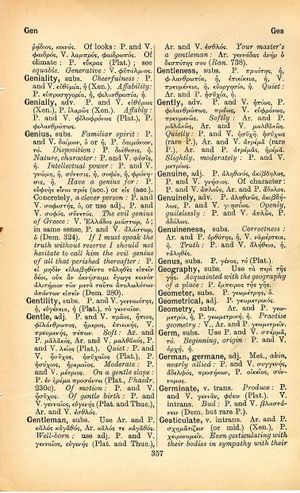germane: Difference between revisions
From LSJ
τὰ δὲ πεπερασμένα πεπερασμενάκις ἀνάγκη πεπεράνθαι πάντα → and the product of a finite number of things taken in a finite number of ways must always be finite
m (Text replacement - "link={{" to "link={{") |
m (Text replacement - "(|thumb)\n(\|link=)" to "$1$2") |
||
| Line 1: | Line 1: | ||
{{Woodhouse1 | {{Woodhouse1 | ||
|Text=[[File:woodhouse_357.jpg|thumb | |Text=[[File:woodhouse_357.jpg|thumb|link={{filepath:woodhouse_357.jpg}}]]'''adj.''' | ||
|link={{filepath:woodhouse_357.jpg}}]]'''adj.''' | |||
Met., <b class="b2">akin, nearly allied</b>: P. and V. [[συγγενής]]. [[ἀδελφός]], προσήκων, P. [[οἰκεῖος]], [[σύννομος]]. | Met., <b class="b2">akin, nearly allied</b>: P. and V. [[συγγενής]]. [[ἀδελφός]], προσήκων, P. [[οἰκεῖος]], [[σύννομος]]. | ||
}} | }} | ||
Revision as of 17:09, 18 May 2020
English > Greek (Woodhouse)
adj.
Met., akin, nearly allied: P. and V. συγγενής. ἀδελφός, προσήκων, P. οἰκεῖος, σύννομος.
Latin > English (Lewis & Short)
germāne: adv., v. germanus.
Latin > French (Gaffiot 2016)
germānē (germanus), réellement, fidèlement : Aug. Civ. 2, 13.
Latin > German (Georges)
germānē, Adv. (1. germanus), echt, animus germ. Romanus, Augustin. de civ. dei 2, 13. p. 68, 14 D. 2

